As a professional copywriting journalist focusing on eco-friendly office solutions, I’m excited to delve into our main topic: Eco-Friendly Commercial Recyclable Carpet Tiles for Office Spaces. Recyclable carpet tiles are not just a trend; they embody a commitment to sustainability and environmental responsibility within the professional sphere. The spotlight on Tarkett’s DESSO Serene and Serene Colour collections highlights the integration of 100% recyclable materials in their manufacturing.
Key Takeaways
- Recyclable carpet tiles are becoming an essential part of sustainable design in office spaces.
- Tarkett’s DESSO Serene and Serene Colour collections contain 100% recyclable materials.
- The ReStart take-back and recycling program ensures that used recyclable flooring is reprocessed into new floors.
- Carpet tiles made of 100% regenerated ECONYL® yarn contribute to a sustainable future in commercial design.
- Choosing eco-friendly flooring options supports environmental responsibility and the circular economy.
Why Sustainable Carpet Tiles Are the Future of Office Design
Sustainable carpet tiles represent a major shift in the landscape of office design, moving beyond aesthetics and comfort to address the urgent need for environmental stewardship. By adopting the Cradle to Cradle philosophy, the industry is transitioning towards products that have no negative impact on people or the planet.
GraphicSprings highlights that carpet tiles made from recycled materials are sustainable, with many containing recycled backing from materials like plastic bottles, nylon, and even recycled tires.
Brands such as Ege Carpets have made considerable progress in achieving this objective by offering an entirely Cradle to Cradle Certified® range of carpets. With these certifications in place, customers contribute to the creation of a sustainable environment, a key factor in the push towards greener office spaces.
“Achieving Cradle to Cradle Certification is a pathway to designing ecologically creative systems that celebrate our human diversity, cultural richness, and environmental abundance.” – Ege Carpets
The introduction of Ecotrust backing, made from repurposed plastic bottles, exemplifies this shift by enhancing acoustics and comfort while also benefiting the environment. This highlights the growing momentum towards sustainability in future office design. Let’s dive deeper into the advantages this revolutionary approach provides, setting a new direction for eco-friendly flooring solutions in the context of the circular economy.
- Reduced waste: Sustainable carpet tiles contribute to the reduction of waste in office spaces, enabling businesses to minimize their environmental footprint.
- Improved indoor air quality: Eco-friendly carpet tiles are made from materials that do not emit harmful chemicals or odors, improving indoor air quality and overall health in offices.
- Resource conservation: The use of recycled materials in the manufacturing process helps to conserve valuable resources, with products like Ecotrust backing utilizing discarded plastic bottles as a new raw material source.
- Extended lifespan: High-quality, sustainable carpet tiles often have a longer lifespan compared to traditional carpet options, resulting in less frequent replacement needs and reduced environmental impact.
- Positive brand image: Companies that choose sustainable carpet tiles demonstrate their commitment to environmental responsibility, which can enhance their reputation in the eyes of customers, employees, and other stakeholders.
In conclusion, sustainable carpet tiles are indeed the future of office design, paving the way for a new era of environmentally conscious flooring solutions. Embracing Cradle to Cradle Certification and innovative materials, these eco-friendly options provide a solid foundation for businesses looking to leave a positive impact on both the planet and their bottom line.
The Aesthetic and Functional Benefits of DESSO Serene and Serene Colour Collections
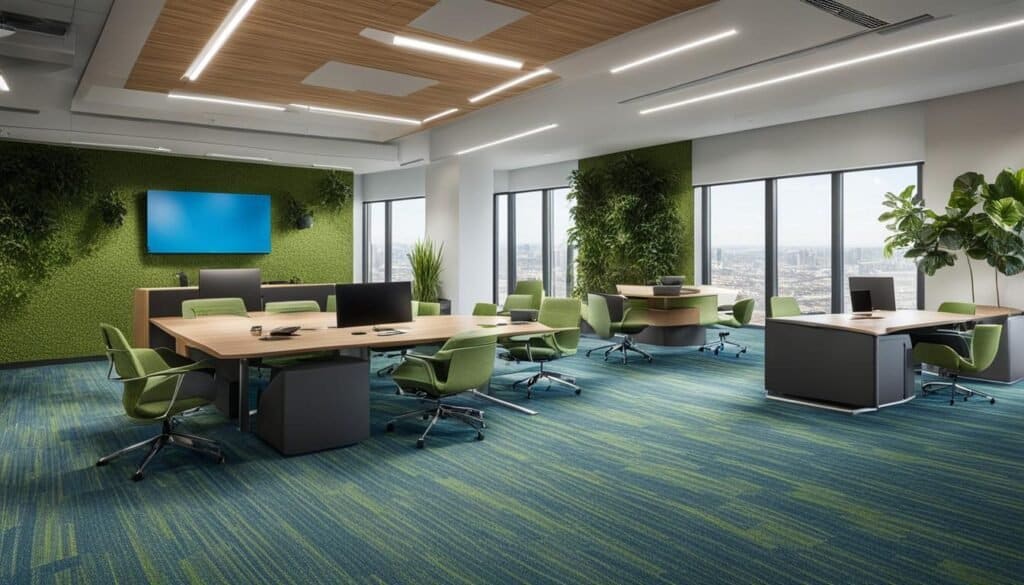
As we explore the DESSO Serene and Serene Colour collections, their aesthetic appeal and functional attributes make them an excellent choice for creating tranquil and productive office spaces. Let’s delve into some of these benefits and examine how they contribute to a harmonious and creative work environment.
Bringing Nature Into the Office with Serene Hues
The DESSO Serene collection offers a palette of nine neutral tones, inspired by the calming elements of nature. From cool to warm hues, these carpet tiles create a visual layout atmosphere designed to foster office tranquility by incorporating organic patterns and serene hues. The tactile nature of these tiles adds a unique textural element to office flooring, further solidifying their role in curating a nature-inspired design that promotes well-being and productivity.
Fostering Creativity with Flexibility in Design
Complementing the DESSO Serene collection, the DESSO Serene Colour range introduces eight vibrant accent tones to inject creativity and flexibility into the workspace. The design flexibility of these collections allows for a seamless transition from neutral to colorful accents, enabling dynamic and engaging interior spaces. The compatibility of these collections ensures coherent design across different office areas, fostering a sense of connection and adaptability that is vital for a creative work environment.
| Collection | Hues Available | Design Features |
|---|---|---|
| DESSO Serene | Nine neutral tones | Organic patterns, serene hues, and tactile tiles |
| DESSO Serene Colour | Eight accent tones | Vibrant accents, design flexibility, and interior spaces connectivity |
In conclusion, the DESSO Serene and Serene Colour collections offer the perfect balance of aesthetics and functionality to create a harmonious, nature-inspired office space. By incorporating serene hues, organic patterns, and design flexibility, these carpet tiles elevate the overall atmosphere and promote a productive and creative work environment.
Creating Green Spaces with 100% Recyclable Carpet Technology
Addressing the growing demand for sustainable solutions, Tarkett has emerged as a frontrunner in the domain of green spaces with its 100% recyclable carpet technology. As the landscape of consumer preference shifts towards eco-friendliness, Tarkett’s dedicated carpet recycling center serves as a testament to their commitment to innovation and sustainability.
How Tarkett is Pioneering the Carpet Recycling Process
Tarkett has developed a trailblazing process to separate the constituent parts of carpet tiles – yarn and backing – effectively addressing both resource scarcity and climate change concerns. By transforming used carpets into valuable raw materials, the company has demonstrated its commitment to advancing green technology in the flooring industry.
Their proprietary EcoBase backing system, recycled within Tarkett’s own production process, illustrates their commitment to operating within a circular economy. Furthermore, their alliance with Aquafil enables them to regenerate polyamide 6 yarn into ECONYL®, heightening the level of sustainability in their flooring products.
“Our partnership with Aquafil ensures the conversion of used carpet materials into high-quality, regenerated yarn, reinforcing our commitment to a greener future in office spaces.” – Tarkett
With these groundbreaking advances, Tarkett continues to pave the way for eco-friendly, sustainable office environments focused on reducing waste and mitigating climate change.
Beyond Aesthetics: The Impact of Recycled Materials in Commercial Carpets
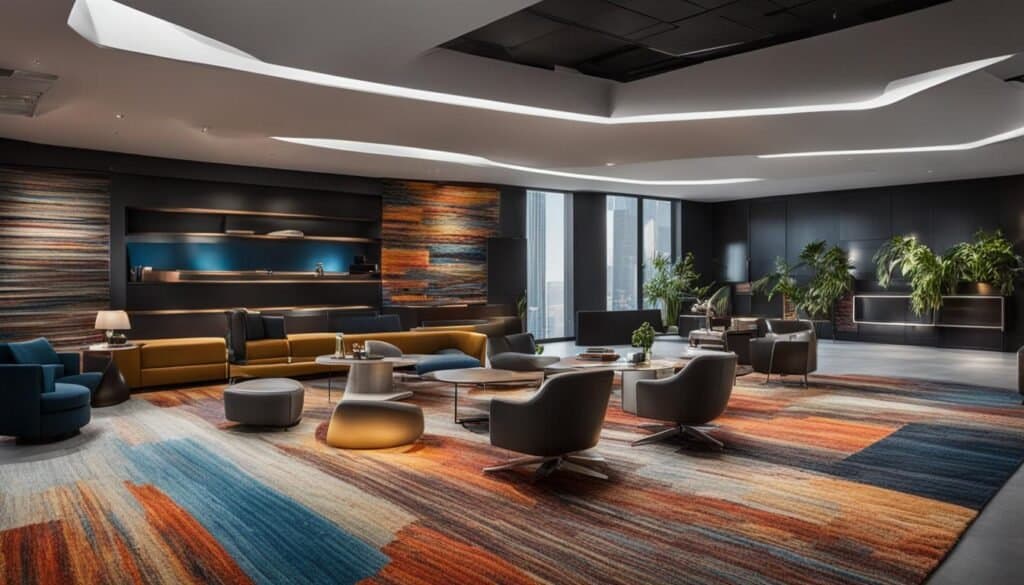
The paradigm shift toward using recycled materials in commercial carpets transcends aesthetic considerations, marking a critical juncture in the carpet industry’s responsibility to the environment. The integration of sustainable practices, such as Ege Carpets’ use of recycled raw materials and the conversion of used plastic bottles into carpet backing, signifies an overwhelming movement towards reducing ecological impact and waste.
Elite Cleaning emphasizes the versatility of carpet tiles, noting their wide range of colors, patterns, and textures that allow for creating a unique look that aligns with your business’s style and brand.
With millions of kilograms of recycled plastic being repurposed and production waste being responsibly managed, the carpet industry’s contribution to a greener future extends well beyond its visual appeal.
Environmentally conscious materials not only create a positive ecological impact but also enable commercial carpets sustainability. To better understand the effectiveness of the eco-friendly carpet solutions, let’s examine some key benefits of integrating recycled materials:
- Significant waste reduction in the carpet manufacturing process.
- Conservation of natural resources through the utilization of recycled content.
- Decreased dependence on non-renewable resources, such as petroleum-based raw materials.
- Reduced energy consumption in the production process, as recycling generally requires less energy than manufacturing new products.
As a result, integrating recycled materials into the production of commercial carpet tiles is instrumental for securing the future of our planet.
“The integration of recycled materials in commercial carpet tiles is not just a trend—it signifies the carpet industry’s commitment to environmental sustainability.”
One notable example of integrating recycled materials into carpet production is the use of EcoBase backing, which constitutes a reusable and fully recyclable carpet backing. Through methods like these, the carpet industry actively contributes to a sustainable circular economy and overall waste reduction, supporting global efforts to combat climate change and resource depletion.
In conclusion, the move toward utilizing recycled materials in commercial carpet production is not merely an aesthetic trend; it represents a transformation in the way we envision and create our spaces. It is a decisive step toward ensuring a more sustainable future for both the carpet industry and the environment as a whole.
Cradle to Cradle Certification: A New Standard in Eco-Friendly Carpets
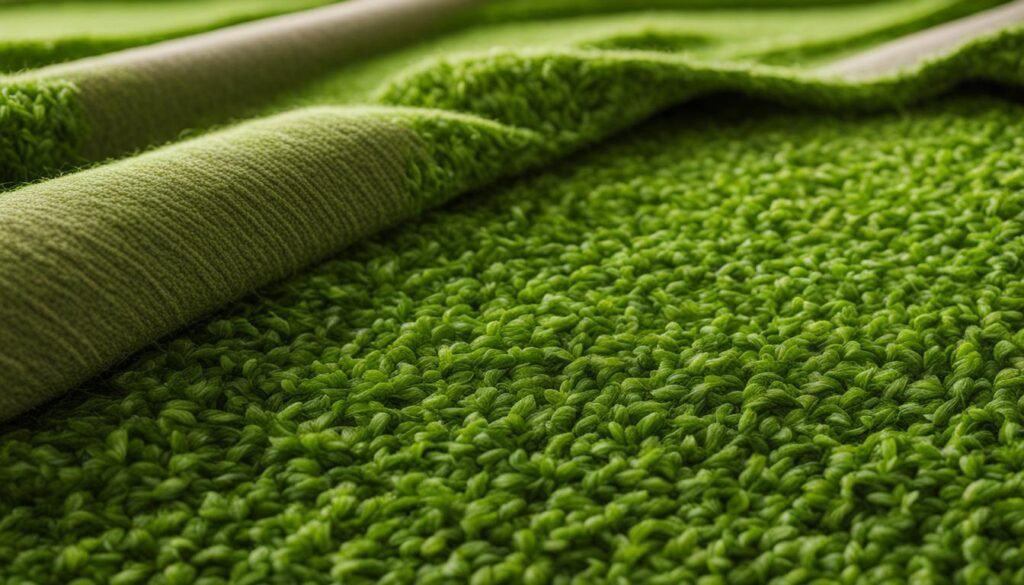
The Cradle to Cradle Certification is quickly becoming the gold standard for eco-friendly carpet options in the industry. This certification supports the transition towards zero-waste operations and sustainable manufacturing, all while maintaining high-quality products for consumers. With a focus on resource efficiency and environmentally conscious practices, Cradle to Cradle Certified® carpets are an essential step forward in achieving a greener future for the carpet industry.
Advancing Towards a Zero-Waste Carpet Industry
As the push for sustainable and eco-friendly carpet standards grows, the role of Cradle to Cradle Certification becomes increasingly crucial. This certification emphasizes a commitment to a perpetual cycle of resource efficiency, where materials are utilized thoughtfully and without causing harm to the environment. By creating 100% Cradle to Cradle Certified® carpet assortments, manufacturers demonstrate their dedication to sustainable practices and resource conservation, aligning with the industry’s ambitious goal of achieving Platinum certification by 2030.
| Benefits of Cradle to Cradle Certification |
|---|
| Encourages environmentally responsible manufacturing |
| Supports the goal of zero-waste operations |
| Promotes resource efficiency and conservation |
| Upholds high-quality product standards while embracing sustainability |
The Role of Ecotrust Felt Backing in Sustainable Carpeting
Ecotrust felt backing is a game-changer in the realm of sustainable carpeting. By repurposing millions of used plastic bottles, Ecotrust transforms a potential environmental burden into a valuable backing material. The inclusion of this sustainable material not only promotes an eco-friendly ethos but also delivers acoustic and comfort benefits in office settings. This innovative approach to sustainability demonstrates the carpet industry’s proactive stance on integrating recycled materials into mainstream products while maintaining quality and performance.
“Cradle to Cradle Certification serves as a powerful catalyst for industrywide change, driving businesses towards more sustainable and eco-friendly carpet solutions.”
With the continued evolution of carpet sustainability, the adoption of Cradle to Cradle Certification and the use of materials like Ecotrust felt backing signal a promising future for the industry. By embracing these sustainable advancements, manufacturers, consumers, and businesses can work together to pave the way for a greener, more environmentally responsible world.
EcoBase and ECONYL® – Leading the Way in Carpet Innovation
EcoBase and ECONYL® are revolutionizing the carpet industry with their innovative approach towards creating sustainable and eco-friendly commercial flooring solutions. As the environmental impact of flooring materials comes under increasing scrutiny, these two groundbreaking materials have emerged as frontrunners in the effort to reduce waste and promote circularity in the industry.
Developed by Tarkett, EcoBase is a proprietary backing that is wholly recycled within the company’s production processes. This approach minimizes waste and ensures that valuable materials are utilized to create new products. Meanwhile, Aquafil’s ECONYL® is a regenerated nylon yarn made from recovered materials, such as discarded fishing nets and other aquatic waste. This innovative yarn is transforming the way we think about the environmental impact of the materials we use in our offices and homes.
“EcoBase backing and ECONYL® yarn underscore the carpet industry’s commitment to not only reducing environmental impact, but also pioneering the use of innovative, sustainable materials in commercial flooring solutions.”
Both EcoBase and ECONYL® serve as inspiring examples of how the carpet industry is embracing sustainable innovation. By reducing waste, repurposing valuable materials, and promoting a circular economy, these hitherto niche solutions are fast becoming mainstream options for environmentally conscious businesses and individuals.
- EcoBase: A fully recyclable backing material that minimizes waste and promotes circularity in the carpet industry.
- ECONYL®: A high-quality regenerated nylon yarn made from recovered materials, such as discarded fishing nets and other aquatic waste, supporting the transformation towards sustainable products in the industry.
The increasing adoption of EcoBase and ECONYL® by major brands and designers is a testament to the growing importance of sustainable innovation in the carpet industry. As more and more businesses choose these eco-friendly materials, we move closer to realizing a greener future for commercial flooring and office spaces.
Greenfloors Commercial Carpet Tiles: Performance Meets Sustainability
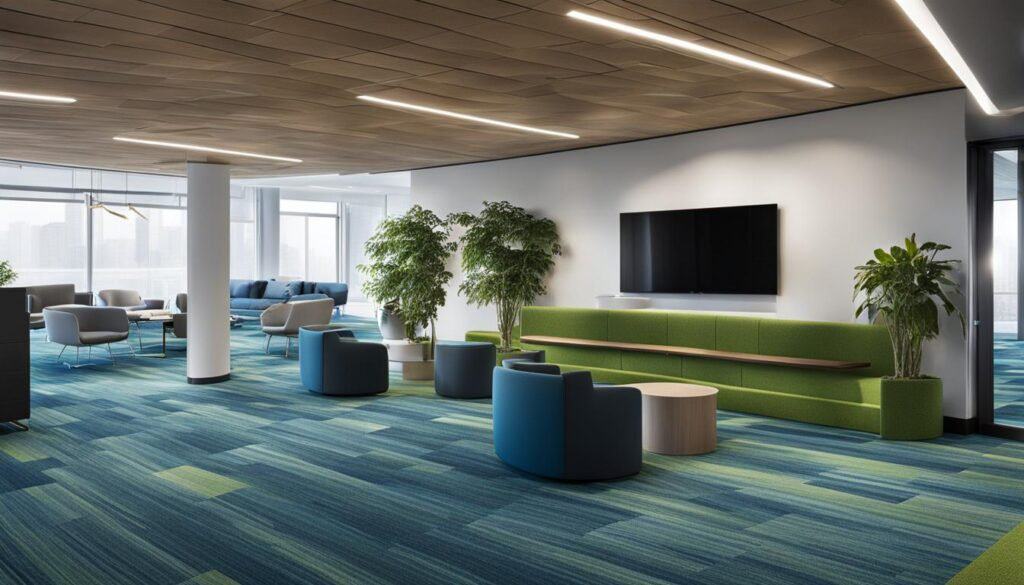
Greenfloors Commercial Carpet Tiles exemplify the perfect synergy of performance and sustainability. Designed with the EPA’s environmental guidelines at their core, these tiles achieve industry standards while incorporating recycled nylon and backing. This helps in clearly evidencing the brand’s environmental stewardship and commitment towards our planet.
Modular Designs for Maximum Versatility and Reduced Waste
One of the most striking features of Greenfloors Commercial Carpet Tiles is their modular designs. These versatile floor coverings offer businesses the flexibility to create dynamic flooring patterns and effortlessly adapt to design changes as per their requirements. Additionally, the modular nature of these carpet tiles helps in mitigating waste to a great extent. For instance, when a tile is damaged, it can be individually replaced, rather than discarding the entire floor. This not only benefits the environment by decreasing landfill contribution, but also introduces cost-efficiency and adaptability into the office flooring equation.
| Features | Greenfloors Commercial Carpet Tiles |
|---|---|
| Recycled Materials | Recycled nylon and backing |
| Modular Design | Yes |
| Eco-friendly Certification | EPA’s environmental guidelines |
| Waste Reduction | Individual tile replacement |
| Design Versatility | Unlimited design patterns |
In conclusion, by choosing Greenfloors Commercial Carpet Tiles for office spaces, businesses can not only create visually appealing floor designs but also contribute to the cause of environmental sustainability. The modular design and the incorporation of recycled materials demonstrate the brand’s commitment to waste reduction, performance and sustainability; making these tiles an ideal choice for office flooring solutions.
Financial and Environmental Cost-Savings with Carpet Tile Overruns
Carpet tile overruns present an opportunity for substantial financial and environmental savings. Greenfloors leverages overrun inventory to offer high-quality tiles at significantly reduced prices, allowing savings of up to 60% compared to original costs. This practice not only translates into immediate financial benefits for businesses but also plays a crucial role in reducing environmental impact by preventing surplus inventory from ending up as waste in landfills. Responsibly managing and utilizing carpet tile overruns signify a deliberate step towards sustainable consumption and resource conservation within the industry.
One way to better understand the benefits of carpet tile overruns is to compare the cost and environmental advantages against traditional flooring options. By doing so, it becomes apparent how meaningful these savings can be for businesses and the environment:
| Carpet Tile Overruns | Traditional Flooring Options |
|---|---|
| Up to 60% cost savings compared to original prices | Typically no cost savings on surplus inventory |
| Reduced waste and landfill contribution | Surplus materials often disposed of in landfills |
| Increased resource conservation | Higher levels of material waste |
In the face of ever-increasing financial and environmental pressures, businesses must consider not only their bottom line but also their ethical obligations to the planet. By choosing carpet tile overruns, organizations can make a real difference in their environmental footprint while enjoying substantial cost-savings, making it a win-win solution for all involved.
Taking Action for the Environment: The Consumer’s Role in Carpet Tile Recycling
Consumers play an instrumental role in the life cycle of recyclable carpet tiles, directly impacting the environment through their purchasing decisions and recycling actions. By opting for Greenfloors Commercial Carpet Tiles, individuals and businesses engage actively in diminishing waste and conserving natural resources. The use of recycled content in these carpet tiles reflects a proactive stance against the accumulation of waste in landfills, underscoring the power of consumer choice in fostering sustainable industry practices and environmental preservation.
Environmental action starts with understanding the value of carpet tile recycling in reducing the need for new resources and minimizing the growth of landfills. Embracing consumer responsibility in the selection and disposal of office flooring is vital to conserve valuable resources and promote sustainable consumption.
“The greatest threat to our planet is the belief that someone else will save it.” – Robert Swan
To aid in making environmentally responsible choices, consider these key factors:
- Choose carpet tiles with recycled content and recyclable backing systems, such as Greenfloors Commercial Carpet Tiles and Tarkett’s DESSO Serene.
- Support companies with established carpet recycling initiatives, like Tarkett’s ReStart program or Ege Carpets.
- When replacing office flooring, inquire about carpet tile recycling options and appropriate disposal methods to ensure a positive environmental impact.
Resource conservation is not limited to recycling. It encompasses reducing consumption, reusing materials, and maintaining a sustainable approach in every aspect of our lives. By understanding and taking responsibility for our actions, consumers can initiate a positive change in the carpet industry, leading to more sustainable consumption practices and a greener future.
| Environmental Action | Impact |
|---|---|
| Choose carpet tiles with recycled content | Reduces the demand for new resources and helps tackle climate change |
| Recycle used carpet tiles | Prevents millions of square feet of carpeting from ending up in landfills each year |
| Support companies with recycling initiatives | Incentivizes industrywide adoption of sustainable practices |
| Adopt sustainable consumption practices | Reduces waste generation and conserves valuable resources |
By recognizing the consumer’s role in carpet tile recycling, we can be part of the solution to preserve our environment. Through informed decisions, we can drive the industry towards a sustainable future, one office space at a time.
Installation and Maintenance Advantages of Commercial Carpet Tiles
The installation and maintenance of commercial carpet tiles offer significant advantages, enhancing their appeal in the office setting. When it comes to flooring solutions for businesses, choosing a product that combines durability and efficiency with a low maintenance profile is paramount. Commercial carpet tiles have quickly gained popularity among businesses seeking sustainable flooring options without sacrificing performance or aesthetics.
Ease of Installation and Lifespan Benefits
Vinyl-backed carpet tiles not only extend the lifespan of the product but also reduce life cycle costs compared to traditional carpeting. These tiles facilitate faster installation, reducing downtime for businesses, and offer easy underfloor access for essential office infrastructure. Additionally, their modular nature and precise sizing contribute to an efficient installation process, minimizing waste and ensuring a seamless fit.
- Individual tile replacement: Maintenance is simplified, as individual tiles can be replaced if damaged, an efficient solution that extends the carpet’s life and decreases the need for complete replacements.
- Underfloor access: Commercial carpet tiles make it easier to access underfloor utilities or modify the office layout without disrupting the entire floor installation.
- Design versatility: Their modular design allows for creative customization in terms of patterns and color schemes, catering to different office environments and evolving design trends.
| Feature | Commercial Carpet Tiles | Traditional Carpeting |
|---|---|---|
| Installation Time | Quick and efficient | Time-consuming and labor-intensive |
| Maintenance | Easy individual tile replacement | Requires complete replacement in case of damage |
| Underfloor Access | Simple to access and modify | Difficult to access without disruption |
| Flexibility in Design | Bespoke patterns and colors | Limited customization options |
| Life Cycle Costs | Lower due to efficient installation and maintenance | Higher due to extensive labor and replacement needs |
In conclusion, commercial carpet tiles represent an intelligent choice for businesses looking to balance the needs for aesthetic appeal, durability, and minimal maintenance. With the added benefits of eco-friendliness and a focus on sustainable material sourcing, they have become an attractive flooring option for the modern-day office environment.
Conclusion on Floor Carpet Tiles That Are Eco-Friendly
In our journey exploring sustainable flooring and eco-friendly office design innovations, recyclable carpet tiles have emerged as an essential component of a greener future. Pioneering design innovations and the adoption of circular production processes are transforming the carpet industry, paving the way for environmentally responsible products and practices.
As consumers, we play a vital role in supporting and promoting eco-friendly flooring options. By opting for products made from recyclable materials and championing responsible consumption, we can contribute to the development of a sustainable future for our office environments and beyond.
Embracing environmental responsibility and conscious consumerism is paramount in the shift towards a more sustainable world. It is through our informed actions and steadfast commitment to eco-friendly choices that we can create a lasting, positive impact on our planet.
FAQ on Recyclable Carpet Tiles for Office Spaces
Q: What are eco-friendly yarns used in making recyclable carpet tiles?
A: Eco-friendly yarns used in making recyclable carpet tiles are often derived from various recyclable materials like fishing nets, used carpets, and post-consumer vinyl backed carpet. Many manufacturers like Interface and Shaw actively collect these materials and recycle them into yarns for their carpet tile collections.
Q: How can these carpet tiles help reduce landfill waste?
A: The process of actively collecting and recycling post-consumer vinyl backed carpet and other materials significantly reduces the amount of waste directed to the landfill. On average, it’s estimated that recycling programme can save several thousand pounds of carpet from going to landfill each year.
Q: Can old or used carpets be recycled into carpet tiles?
A: Yes, old or used carpets can certainly be recycled into carpet tiles. This is done through a process where the used carpets, fishing nets, and other materials are broken down into their composite fibers or ‘yarn’ and then reassembled into new carpet products.
Q: How is installing carpet tiles different from broadloom carpet?
A: Installing carpet tiles is generally faster, more efficient, and produces less waste than installing broadloom carpet. Tiles can be individually replaced if a tile gets stained or damaged, which is not possible with broadloom carpet. Carpet tiles also require less space for storage, and the installation is easier to schedule and manage.
Q: How much scrap or waste is produced when installing carpet tiles?
A: Compared to traditional broadloom carpet, installing carpet tiles produces significantly less scrap or waste, as you only need to cut those tiles that will be placed at the edges of the room. Any leftover tiles can be saved for future replacements. Typically, this method can reduce waste by 3-4% compared to your space’s broadloom square footage.
Q: Can vinyl backed carpet tiles be recycled?
A: Yes, post-consumer vinyl backed carpet tiles can be recycled. Some manufacturers, like Interface, have developed recycling programs that focus on collecting and recycling post-consumer vinyl backed carpet tiles.
Q: How is the quality ensured for recycled carpet tiles?
A: Recycled carpet tiles go through a thorough cleaning process to remove any dirt, stains or glue residue. They are then checked for quality before they are fronted for resale. Most manufacturers also certify their carpet products with relevant industry eco-system to provide quality assurance to their commercial use customers.
Q: What warranty comes with eco-friendly commercial recyclable carpets?
A: Warranties with eco-friendly commercial recyclable carpets vary by manufacturer. However, most warranties cover things like wear, stain resistance, and colourfastness. It’s best to discuss the specifics with the manufacturer or retailer so you can understand exactly what aspects of the carpet’s condition are covered.
Q: How much does it cost to install recyclable carpet tiles?
A: The cost to install recyclable carpet tiles can vary depending on a number of factors, including the cost of the tiles themselves, the cost of the adhesive to install them, and the size of the space. Typically, you can expect to pay a few dollars per square foot. It’s a good idea to get multiple estimates before making a final decision.
Q: How are modular carpets with CQuest™Backed Carpet Tiles eco-friendly?
A: Shaw’s CQuest™Backed Carpet Tiles feature a backing made from recycled materials, including post-consumer carpet and vinyl. This makes these modular carpets a more eco-friendly choice, as they help contribute to the circular economy where waste materials are re-used and kept in use longer, reducing their environmental impact.

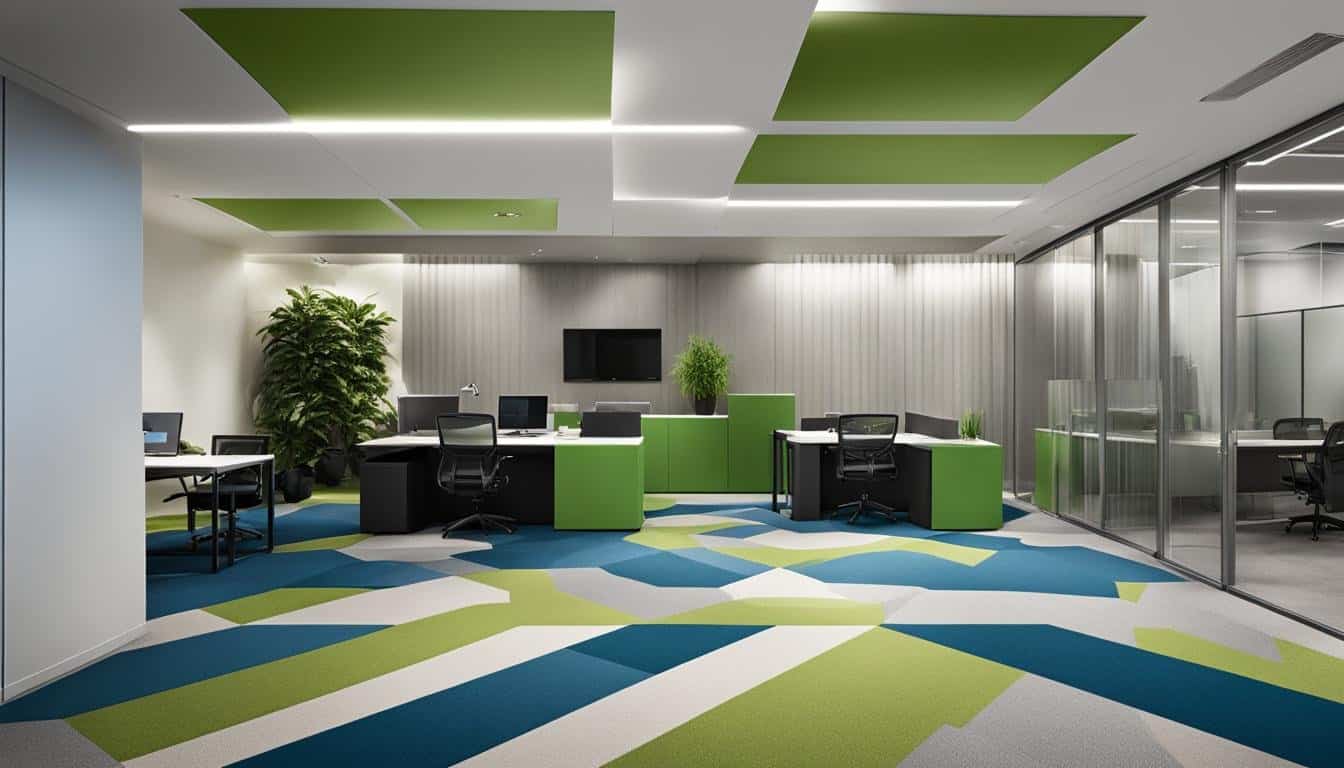


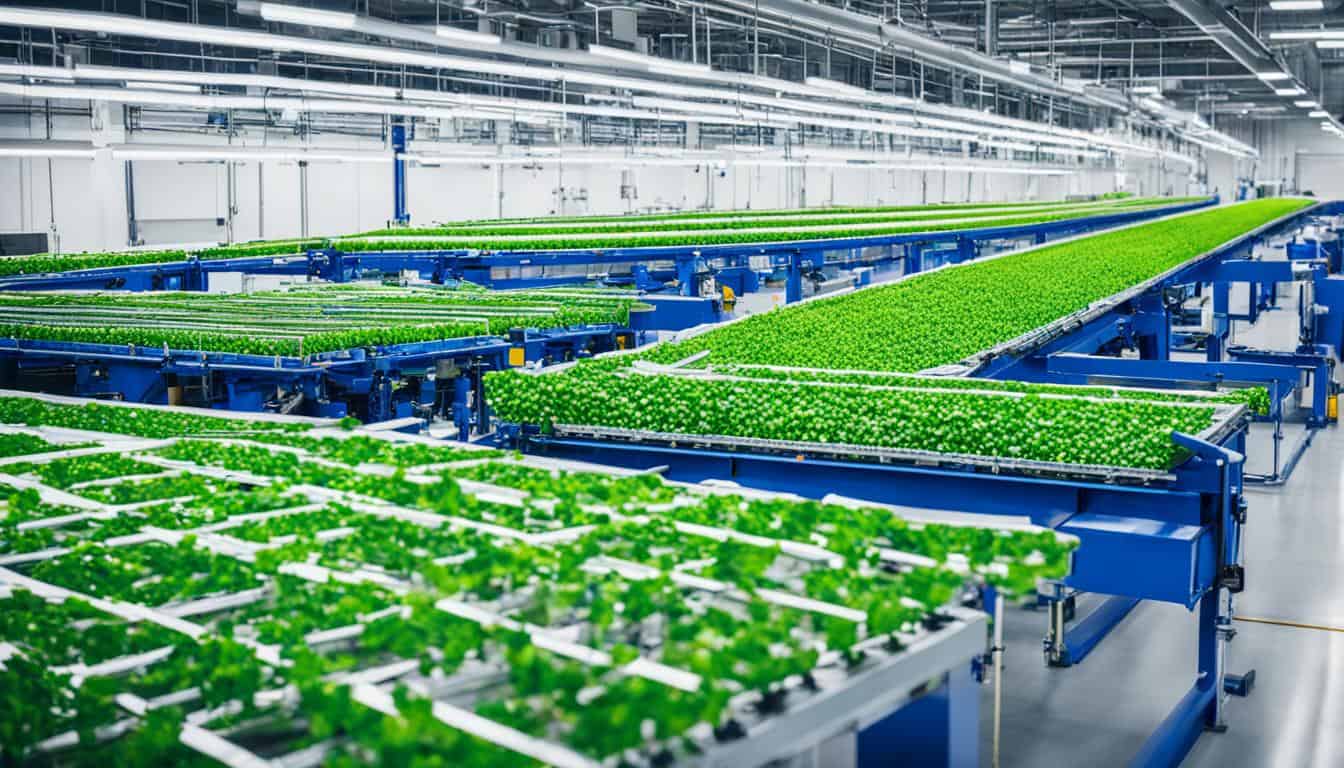
Leave a Reply